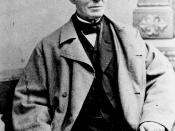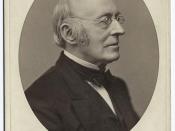Having traveled over a considerable portion of these United States, and having, in the course of my travels, taken the most accurate observations of things as they exist -- the result of my observations has warranted the full and unshaken conviction, that we...are the most degraded, wretched, and abject set of beings that ever lived since the world began; and I pray God that none like us ever may live again until time shall be no more. They tell us of the Israelites in Egypt, the Helots in Sparta, and of the Roman Slaves, which last were made up from almost every nation under heaven, whose sufferings under those ancient and heathen nations, were, in comparison with ours, under this enlightened and Christian nation, no more than a cipher-- or, in other words, those heathen nations of antiquity, had but little more among them than the name and form of slavery; while wretchedness and endless miseries were reserved, apparently in a phial, to be poured out upon, our fathers ourselves and our children, by Christian Americans!
-- David Walker's Appeal, September 1829
Historians traditionally date the beginning of the modern Abolitionist Movement in 1831, with the publication of William Lloyd Garrison's The Liberator.
Indeed, even the out-spoken Garrison scoffed when he read the Appeal by David Walker. At the time, anti-slavery sentiment was cautious and calculated, and emancipation was thought to be a gradual event, one that could span decades. Walker, however, had different ideas. He called for the immediate and unconditional freedom of all slaves in America. Moreover, he called for all slaves to revolt against their masters, saying that "...it is no more harm for you to kill a man who is trying to kill you, than it is for you to take a drink...


